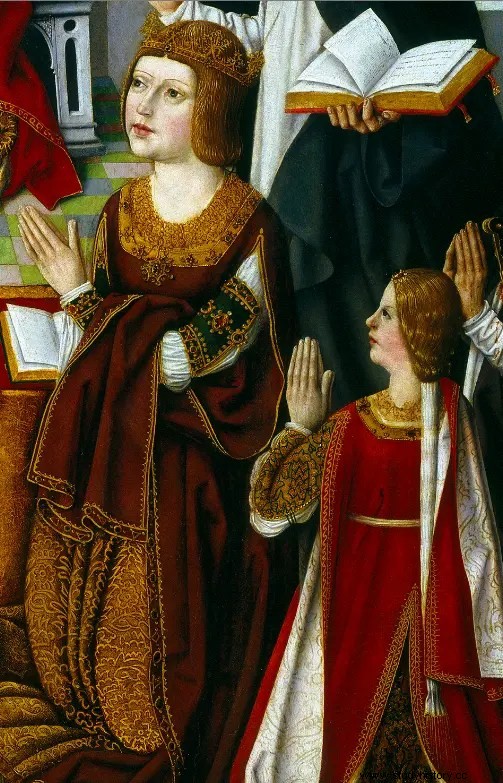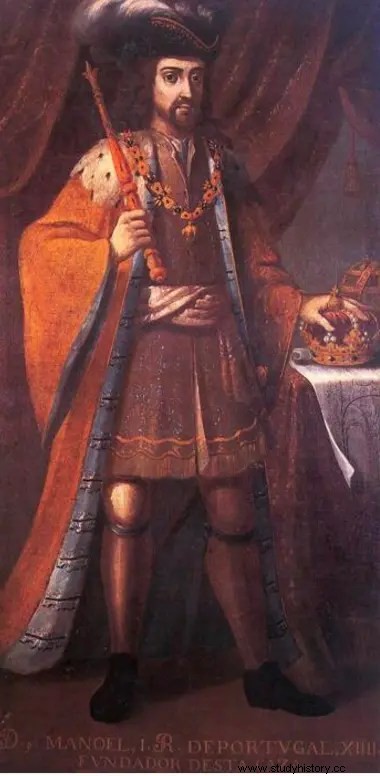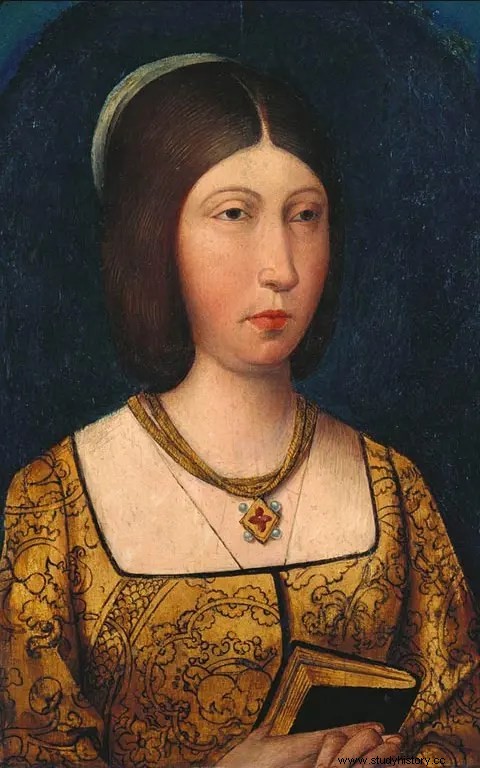If Jeanne the Mad and Catherine of Aragon, two daughters of Isabella the Catholic who will meet tragic destinies, are often familiar to us, we do not look much at Isabelle, the eldest daughter . A young woman who, destined to serve Portuguese politics of his parents, was unlucky. His premature death changed the destiny of Spain...
Isabelle Junior
Isabella of Aragon (Isabel), born in 1470, is the first child of the famous Catholic Monarchs, Isabella of Castile and Ferdinand of Aragon . The birth of a daughter is a disappointment for her parents, who then seek to assert their legitimacy to the throne. Which will never prevent them from showing a lot of love to this first fruit of their union. Will follow Juan, Juana (Jeanne La Folle), Maria and Catalina (Catherine, wife of the future Henry VIII).
We often compare Isabelle (junior) to her mother:she would have inherited her intelligence, her virtue and her magnanimity. She is very close to this woman who gives her a very good education, like all her children. All the closer because she often accompanies her mother on her travels , as the eldest daughter, and stands by her side during official rejoicings or entrances into conquered cities.
At the end of the 15th century, the Spanish peninsula was divided into five independent kingdoms :Castile, Aragon, Portugal, Navarre and the Muslim kingdom of Granada. Isabella and Ferdinand jointly reign over their two respective kingdoms:Castile and Aragon. They have a primacy, implicit and unofficial, over the other kingdoms.
First Portuguese marriage
Isabella married, in 1490, Prince Alfonso , heir to the crown of Portugal. This union fulfills the wishes of his parents, eager to ensure the benevolence, or at least the neutrality, of the only power capable of countering their will to put an end to a 10-year war with the Infidels, by the conquest of the kingdom. from Granada. It is also a means of settling commercial disputes opposing the two kingdoms in the Atlantic.
On Easter Sunday, the marriage by proxy takes place, officiated by Cardinal Mendoza. The ceremonies are of incredible splendor :jousts and games follow one another for more than two weeks. All the wives of the greatest lords of Spain compete in luxury, dressed in brocade and crumbling under jewels...
Isabelle's dowry is impressive:large sums of silver and gold, gold necklaces adorned with precious stones, gold chains, jewels of great value, clothes of brocades, gold thread, embroidered silk of pearls… The war in Granada is not yet over, but the Catholic sovereigns have not skimped on the expenses for the wedding of their eldest daughter!

In November, Isabelle accompanies her dear daughter for several kilometers then hands her over to Cardinal Mendoza, who is responsible for escorting her to the border. In Portugal, we rejoice at the arrival of this Infanta. The people are attached to the young woman from the first contacts . The parties organized in his honor are splendid:
Shows, balls, tournaments, reed jousts, light races that the Portuguese had learned from the Moors and where they excelled, were given with a magnificence in keeping with the wealth of a Court that had become one of the most opulent in Europe since its recent overseas conquests.
Isabelle swims in happiness. In love with her husband , which gives her back her passion, she loves with all her heart this new country which has adopted her so quickly. An idyllic honeymoon that comes to an abrupt end, after only six months, when Prince Alfonso dies from a fall from his horse , shattering Isabelle's dreams.
Widow at 20
In Portugal, in Spain, there is consternation. Isabelle, crippled with pain, returns to Castile. Neither the caresses of his younger sisters Juana, Maria and Catalina, nor the love of his mother can alleviate his immense grief .
This young twenty-year-old widow is determined to remain so until the end of her days. His already deep piety becomes more austere and more ardent. Disappointed, hurt, she devotes herself excessively to the exercises of piety and eats less and less:she loses weight and her already not very flourishing health deteriorates.
In 1495 Don Manuel succeeded to the throne of Portugal and became King Manuel I st , later dubbed The Fortunate . He remembers the little Infanta Isabella, for whom he conceived tender feelings while she was married to Prince Alfonso. His memory haunts him. He decides to ask for her hand.
This settles the affairs of the Queen of Castile, who announces King Manuel's proposal to her daughter. But she is met with a categorical refusal. How, to return to this country where she knew love to marry another? No way!
The sovereign does not insist. The grief is still too recent, the wounds have not healed. She is counting on time to overcome this resistance , and on the sensitivity of her daughter who, she is sure, will be touched by the constancy of the prince's feelings. Time passes and the Infanta still resists, deprives herself of food, fasts to the last extremity.
From time to time Isabelle represented to her daughter the merits of resignation and submission to the divine will; she showed him what duties fell to women born on the steps of a throne, destined to increase the glory of their country by the sacrifice of their tastes and their feelings.
Second Portuguese marriage

Isabelle's technique, guided as much by politics as by her love for her eldest daughter, seems to be bearing fruit. After 5 years of widowhood , the young woman seems ready to contract a new union, or in any case no longer protests at this prospect!
Suddenly she makes up her mind and agrees. But on one condition, cruel and harmful for the future :that she can freely eliminate the Jewish refugees in Portugal and persecute the heretics… The worthy daughter of the Catholic Monarchs! She is undoubtedly influenced by the Franciscan Cisneros, at the head of the archdiocese of Toledo, an austere and intransigent man. His directors of conscience, who became secret agents of the Inquisition , certainly encouraged her in this voice :
They would have represented to her the violent death of her first husband as the punishment for her lukewarmness.
Jews become the pet peeve of the young woman. According to her, they are the cause of "misfortunes with which the royal house of Portugal had for some time been struck ". Yet they are widely esteemed at the Court of Portugal… Manuel I er protests but Isabelle is inflexible. So the heart prevails over the reason of this good and intelligent prince. He accepts , albeit with some reluctance.
On September 13, 1497, Isabella accompanied her eldest daughter to the Portuguese border. Rebel! This time however, the nuptials are celebrated without any magnificence. These are the wishes of the bride, who looks rather like a lamb led to the sacrifice...
Heiress of Castile and Aragon
On October 4, 1497, Prince Juan of Aragon died quite suddenly , leaving the Queen of Castile grieving over the loss of her only son and heir to the kingdom. All hopes then turn to Portugal:Isabella being the eldest daughter of the Catholic Monarchs, she becomes the first in the order of succession to the thrones of Castile and Aragon.
As custom requires, Isabelle and Manuel I er must take possession of this inheritance. After making her parents promise that the kingdoms of Castile and Portugal would remain independent, Isabella agrees to go, with Manuel, to Toledo, to receive the oath of the Cortes of Castile March 16, 1498. Same ceremony in Zaragoza, with the Cortes of Aragon . The Portuguese sovereigns suffered a snub there:the Aragonese Constitution wants "that no queen should hold the scepter in their country .
Isabelle needs to give birth to a son , who alone will be able to claim the title of King of Aragon on the death of the Catholic Monarchs. Do they need a male? Well, we can only hope that Queen Isabella of Portugal gives birth to a boy. That's good, she's pregnant. On August 24, 1498, she felt the first pains of childbirth, which turned out to be difficult.
An untimely death

In fragile health since birth, Isabelle did not spare herself , forcing herself to multiple deprivations since her early widowhood. Weakness accentuated by moral pains, a difficult pregnancy and a grueling journey through Spain...
Isabelle is exhausted giving birth to Prince Miguel. Sensing her last hour coming, the Queen of Portugal asks to confess, and expires a few hours later. The little prince, very fragile, survives. It is entrusted by Manuel I er to his in-laws.
Despite this tragic loss, the premature death of her favorite daughter added to that of her adored son, Isabelle has no time to feel sorry. Quickly, she will attend the Cortes of Zaragoza to have the legitimacy of Prince Miguel recognized.
All the crowns of the Peninsula (except that of Navarre) were suspended on the head of the Infante de Portugal.
Alas, the little prince died two years later. Portugal no longer has to fear becoming a vassal kingdom of Castile and Aragon.
Manuel, however, wishes to remarry. As long as you do, you might as well pick from the same family! He marries Maria, younger sister of his late wife and third daughter of the Catholic Monarchs. She will give him 10 children , including 6 boys who will survive childhood...
Be that as it may, at the dawn of the year 1500, the crowns of Castile and Aragon become the inheritance of Princess Juana, to the great misfortune of the one who will be known as Jeanne La Crazy… Ah, the vagaries of History!
